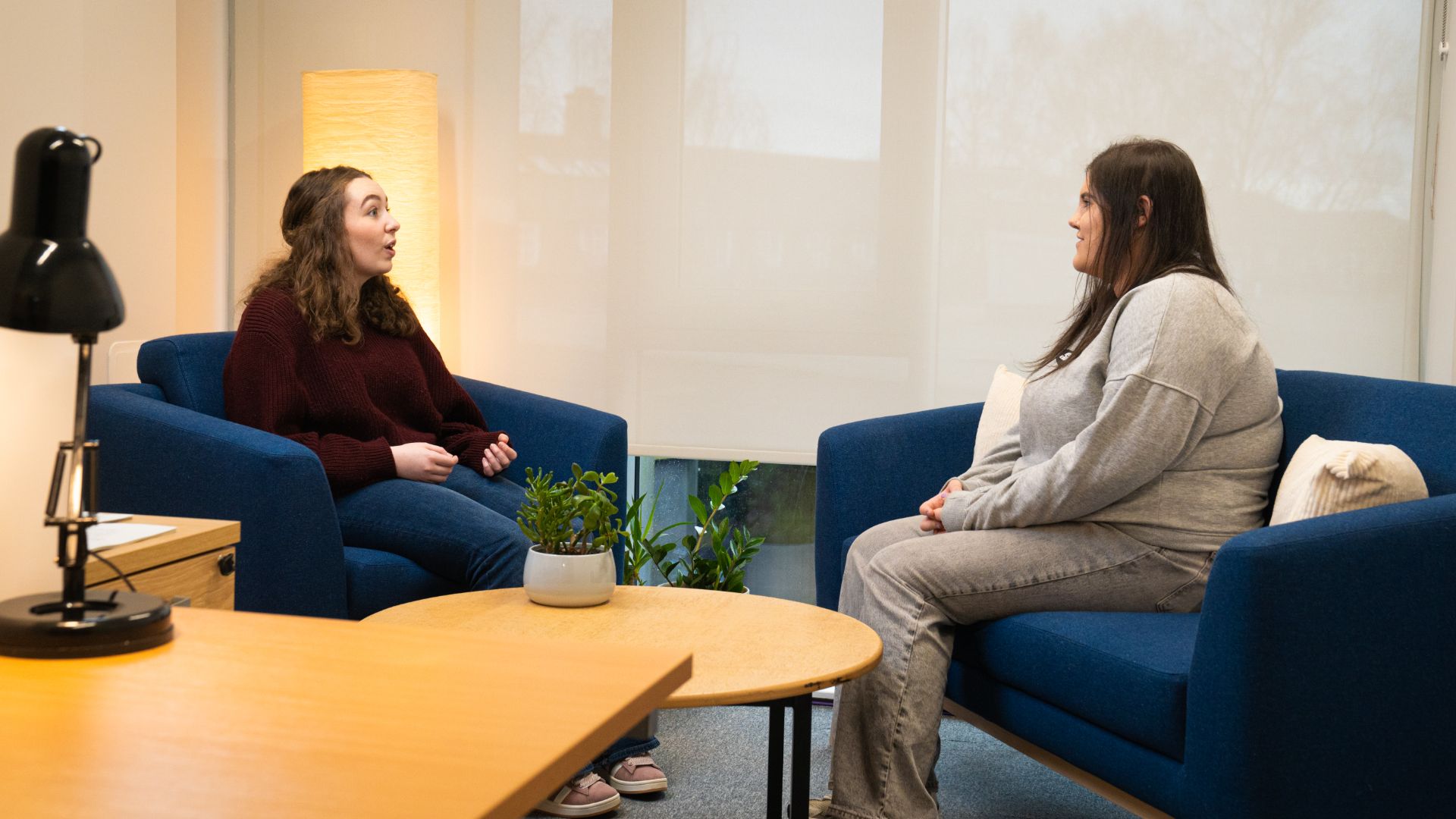
On our new BSc (Hons) Psychology with Clinical and Health Perspectives, you will explore concepts and theories of the mind and behaviour and their application to human functioning. We spoke to Senior Lecturer in Clinical Psychology Dr Charlotte Cox, who tells us more about her own journey into clinical psychology, the new degree, myth-busting and the different career options in this area.

Tell us a bit about yourself and your journey to clinical psychology
As a teenager my first love was reading and, without really thinking about a career pathway, I did my first degree in English Literature. I then went on to work in education and community development for a number of years before deciding to do a psychology conversion degree in Cardiff. After this, I worked as a research assistant and an assistant psychologist before completing my Doctorate in Clinical Psychology in London.
Throughout my career in mental health, I have been privileged to work therapeutically with survivors of complex traumas. This client group has taught me so much and I value working in this specialism. In terms of research, I have a particular interest in the interactions between autism and trauma.
I believe that mental health struggles are best understood not as a product of a diseased or ‘broken’ brain, but rather as an understandable response to difficult life experiences. I am concerned about issues of social justice in relation to the care and treatment of people with mental health difficulties, and I am committed to advocating for trauma informed care, raising the voices of people with lived experience, and promoting inclusive and accessible mental healthcare.
Why should students choose Edge Hill University to study clinical and health psychology?
Studying on our new BSc (Hons) Psychology with Clinical and Health Perspectives degree offers several distinct advantages.
We help you to think like a psychologist
We integrate learning opportunities that help you build and practice skills in relation to personal and professional scenarios. The courses comprehensive focus on applying theoretical concepts to real-world settings ensures you will gain practical experience in clinical and non-clinical environments, with access to state-of-the-art facilities.
We have a strong ethos of student involvement
We have plenty of opportunities and facilities for you to get involved in our departmental activities and get more out of the course. Amongst others, this includes research participation, internships, and being a member of our student-led Psychology Society.
Research-informed teaching
All our academic staff are research-active, and we have many Registered Psychology Practitioners, including in Health Psychology, Clinical Psychology, and Coaching Psychology. This means the curriculum is enriched by expert-led insights.
What aspects of the new degree do you teach on?
I lead the Level 6 module, Clinical Psychology and Mental Health. This module provides a real sense of what it means to work psychologically with people with mental health difficulties. As well as teaching about the evidence base for our understanding of different mental health problems and how they are treated, I share some of my own experience of how this plays out in a real-world setting, without discussing any individual cases. The module gives a flavour of what it might look like to work psychologically with people with mental health difficulties. Whilst I speak from my own experience as a clinical psychologist, I also reference other careers that are relevant to this including mental health nurses, psychological wellbeing practitioners, counsellors, and other applied psychologists. The end of the module has a specific focus on career options, and you’ll learn a little about a ‘day in the life’ of different practitioners.
What advice would you give to students who are considering whether clinical practice is the right path for them?
Start by reflecting on your interests. Clinical roles may suit you if you enjoy patient care and therapeutic work, but if research or policy excites you more, consider non-clinical pathways. Gain experience through volunteering or internships in various settings and talk to professionals in different fields to get insights. Explore related areas like nursing or occupational health.
I would also encourage you to remember that a degree such as our BSc (Hons) Psychology with Clinical and Health Perspectives will open up many opportunities for you and you should not restrict yourself to only considering being an applied psychologist. Whilst you study you will get more of an idea about whether clinical practice is for you.
Dispelling myths about clinical psychologists
- Some people think this career is only open to students with degrees from certain universities. This is not the case. The profession is expanding and increasingly there is interest in recruiting applicants from diverse backgrounds, with valuable life experiences as well as academic abilities.
- People often mix up the roles of clinical psychologists and psychiatrists. Although we often work in teams together, our roles and training are very different.
Psychiatrists have medical degrees and have specialised in mental health. They are skilled in diagnosing mental health problems and prescribing medications (although they do always think about psychological and social factors in mental health too).
Clinical psychologists are not medically trained and do not prescribe medication. Instead, clinical psychologists focus on psychological and social factors relating to mental wellbeing and provide interventions like psychotherapy (biological factors aren’t ignored). - Many people believe clinical psychologists only work in therapy or clinical settings. However, there are lots of roles that clinical psychologists take on outside of psychotherapy, some psychologists never deliver psychotherapy at all. Psychologists administer and interpret neuropsychological assessment (such as that used to make a dementia diagnosis, or to consider the cognitive strengths and weaknesses of a person with a brain injury). A lot of our work is also indirect, meaning that we support staff to work psychologically with service users rather than working with the service users ourselves. This can mean running reflective practice groups, offering consultation services, supervising individual practitioners, and delivering training.
What does the role of clinical and health psychologists look like?
The roles of a clinical psychologist and a health psychologist are quite different, but they do have some overlap.
Health psychologists use their skills and knowledge of psychology to promote well-being and healthy behaviours across the population. They are trained to understand the psychological and emotional aspects of health and illness and to improve healthcare and related behaviours. Additionally, the role investigates the nature and effects of communication between health professionals and patients, including interventions to enhance communication, while examining illness’s psychological impact on individuals, families, and carers.
Clinical psychologists have completed a professional doctorate in clinical psychology and work with children and adults, in inpatient and outpatient services, and in community settings. They are trained to work alongside individuals, families and organisations to improve psychological health through evidenced based assessments and interventions. As well as being skilled in different psychotherapy approaches, clinical psychologists are also trained in delivering and interpreting neuropsychological assessments, which might be used in services working with people with brain injuries, dementia or intellectual disability. Clinical psychologists also routinely undertake research and service evaluation, contributing to the current state of knowledge in the field.
Other career options
This degree will not limit you to careers in clinical practice. Learning about and understanding clinical and health psychology sets people up to have a meaningful understanding of human illness and distress which is relevant to multiple career pathways. This could include working in academia, community development, consultancy, social enterprises, or the civil service. Some examples include:
- Roles that promote mental and physical well-being within corporate environments.
- Contributing to public health initiatives by using psychological research to inform health policy, develop campaigns, and address population health challenges.
- Careers in media, working as health communicators or consultants for media outlets, helping to portray health-related issues accurately, or creating content for health education through podcasts, blogs, and social media.
- Roles in patient advocacy groups and health charities, working to represent and support individuals with chronic illnesses, disabilities, or mental health conditions, influencing health policy and providing direct support services.
- Working in areas around environmental health and psychology, helping people adapt to and mitigate the mental and physical impacts of environmental issues.
- Careers in behavioural economics, using psychological principles to understand and influence decision-making in areas like healthcare, finance, and consumer behaviour.
Career enhancing opportunities
Our degree offers a variety of opportunities to explore both clinical and non-clinical career pathways in clinical and health psychology and related fields. The degree integrates both theoretical and practical aspects of health psychology, covering areas like public health, behaviour change, mental health, and chronic illness management. This allows you to gain knowledge applicable to clinical settings (e.g. NHS roles) and non-clinical sectors (e.g. research, public health, or corporate wellness).
We also have partnerships with local health organisations, charities, and businesses to offer work placements and internships. These experiences allow you to explore various sectors, from clinical roles in hospitals to non-clinical roles in research, consultancy, or policy development. There are also modules that focus on professional skills, such as communication and leadership, applicable to clinical and non-clinical roles. We also encourage you to engage in research projects, which can be tailored to clinical interests (e.g. patient care, intervention design) or non-clinical areas (e.g. public health campaigns, corporate wellness programs). We also invite professionals from various clinical and non-clinical sectors to give talks and workshops, providing you with insight into diverse career options. By offering these resources and experiences, you’ll graduate equipped with the flexibility to explore and pursue various careers.
Discover Psychology at Edge Hill UniveristyBSc (Hons) Psychology with Clinical and Health PerspectivesMarch 28, 2025


